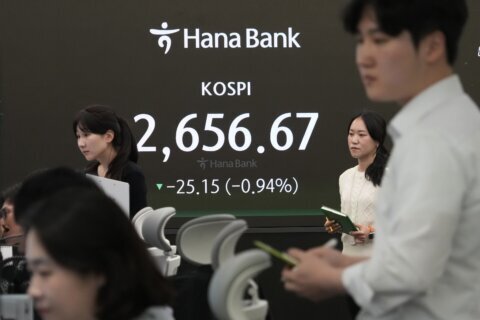CANBERRA, Australa (AP) — Solomon Islands Prime Minister Manasseh Sogavare on Tuesday rejected concerns that regional saftey would be jeopardized by a security treaty between the South Pacific island nation and China.
The United States, Australia and New Zealand are among the nations that have voiced concerns over a leaked draft of the bilateral agreement.
Sogavare told his national parliament that negotiations had concluded but the treaty had not yet been signed.
“We are sensitive to the unfortunate perception held by many leaders that the region’s security is threatened by the presence of China in the region,” Australian Broadcasting Corp. reported him telling parliament.
“This is utter nonsense,” he added. “I find it very insulting … to be branded as unfit to manage our sovereign affairs.”
A document leaked last week indicates that China could boost its military presence in the Solomons, including with visits by warships.
Sogavare said the leaked document was a draft. He would not reveal details of the final document.
The U.S. State Department expressed concern, saying it did not believe China’s security forces and methods needed to be exported.
The Australian and New Zealand prime ministers on Monday voiced concerns about the potential for a Chinese military presence on the Solomons.
Australian Prime Minister Scott Morrison spoke to New Zealand Prime Minister Jacinda Ardern and his counterparts in Papua New Guinea and Fiji about the potential deal.
“The reports that we’ve seen are not a surprise to us and are a reminder of the constant pressure and threats that present in our region to our own national security,” Morrison said.
“This is an issue of concern for the region but it has not come as a surprise. We have been long aware of these pressures,” he added.
Ardern described the possibility of Chinese military forces stationed on the Solomons as “gravely concerning.”
“We see such acts as the potential militarization of the region,” she said. “We see very little reason in terms of the Pacific security for such a need and such a presence,” she added.
Ardern urged Solomons’ leaders “not to look beyond our own Pacific family” when considering the country’s security relationships.
Chinese Foreign Ministry spokesperson Wang Wenbin dismissed those concerns, saying: “The cooperation between China and the Solomon Islands has been warmly welcomed by the Solomon government and people.”
“No attempt to disrupt and undermine the mutually beneficial cooperation between China and the Pacific Island countries will succeed,” Wang told reporters at a daily briefing Monday.
Under the terms of the draft agreement, China could send police, military personnel and other armed forces to the Solomons “to assist in maintaining social order” and for a variety of other reasons. It could also send ships to the islands for stopovers and to replenish supplies.
The draft agreement stipulates that China would need to sign off on any information that’s released about joint security arrangements, including at media briefings.
The Solomons, home to about 700,000 people, in 2019 switched its diplomatic allegiance from Taiwan to Beijing, which was a contributing factor to riots in November.
Australian police have been in the capital Honiara maintaining peace since then under a bilateral security treaty established in 2017. It provides a legal basis for the rapid deployment of Australian police, troops and associated civilians in the event of a major security challenge.
In 2017, when Australian police and troops left the Solomons after 14 years, the two countries signed a bilateral treaty that would enable Australians to return at short notice at the invitation of the Solomons’ prime minister. That treaty was invoked in November and Australian police were in the air within hours of Sogavare requesting help.
Australia had led a force of Pacific Islands police and troops under the Regional Assistance Mission to Solomon Islands from 2003 to 2017. It included 2,300 police and troops from 17 nations, invited by the Solomons’ government. The deployment successfully ended the conflict that killed 200 people.
Solomons opposition leader Matthew Wale said he warned Australian High Commissioner Lachlan Strahan in August last year that the government was negotiating a security agreement with Beijing that could lead to the establishment of the Chinese bases there.
“Personally I am very disappointed in Australia in this matter,” Wale said. “I think Australia saw this coming and if it didn’t, it should have.”
Morrison said Australia was recasting its foreign aid to focus on the Pacific.
“We’ve been aware of the risks right across the Pacific,” Morrison said, referring to Chinese engagement.
In 2018, Australian Senator Concetta Fierravanti-Wells, then minister for international development and the Pacific, said Chinese aid programs in poor Pacific island countries were creating “white elephants” that threatened economic stability without delivering benefits. Beijing protested her criticism.
The Pacific’s traditional aid partners — the United States, Japan, Australia and New Zealand — have stepped up efforts to offer alternatives to China’s Belt and Road Initiative infrastructure partnerships.
Copyright © 2024 The Associated Press. All rights reserved. This material may not be published, broadcast, written or redistributed.






